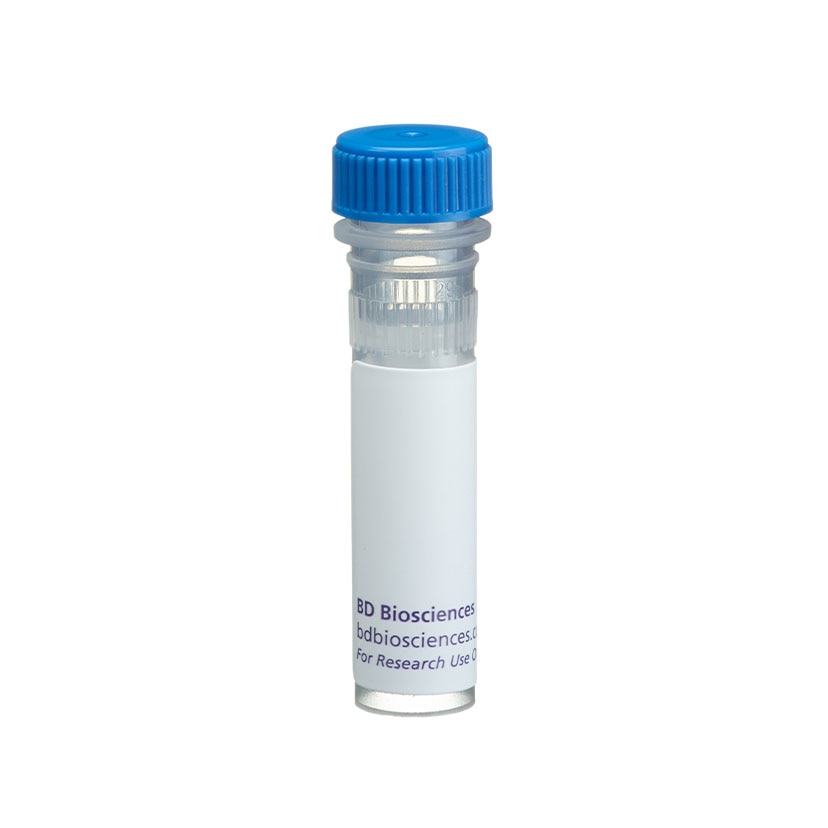-
Your selected location is
Middle East / Africa
- Change location/language
-
Reagents
- Flow Cytometry Reagents
-
Western Blotting and Molecular Reagents
- Immunoassay Reagents
-
Single-Cell Multiomics Reagents
- BD® OMICS-Guard Sample Preservation Buffer
- BD® AbSeq Assay
- BD® Single-Cell Multiplexing Kit
- BD Rhapsody™ ATAC-Seq Assays
- BD Rhapsody™ Whole Transcriptome Analysis (WTA) Amplification Kit
- BD Rhapsody™ TCR/BCR Next Multiomic Assays
- BD Rhapsody™ Targeted mRNA Kits
- BD Rhapsody™ Accessory Kits
- BD® OMICS-One Protein Panels
- BD OMICS-One™ WTA Next Assay
-
Functional Assays
-
Microscopy and Imaging Reagents
-
Cell Preparation and Separation Reagents
Old Browser
This page has been recently translated and is available in French now.
Looks like you're visiting us from {countryName}.
Would you like to stay on the current location site or be switched to your location?
BD Pharmingen™ Purified Mouse Anti-p53
Clone PAb 240 (RUO)




Western blot analysis of p53. Lysate from SV40-transformed COS-7 cells were probed with anti-p53 (Cat. No. 554166). p53 is identified as a band of 53 kDa.



Regulatory Status Legend
Any use of products other than the permitted use without the express written authorization of Becton, Dickinson and Company is strictly prohibited.
Preparation And Storage
Recommended Assay Procedures
SV40-transformed COS-7 monkey kidney cells (ATCC CRL-1651) or other SV40-transformed cell lines are suggested as positive controls. Please refer to http://www.bdbiosciences.com/pharmingen/protocols/Western_Blotting.shtml, for Western blot protocols.
Product Notices
- Since applications vary, each investigator should titrate the reagent to obtain optimal results.
- Please refer to www.bdbiosciences.com/us/s/resources for technical protocols.
- Caution: Sodium azide yields highly toxic hydrazoic acid under acidic conditions. Dilute azide compounds in running water before discarding to avoid accumulation of potentially explosive deposits in plumbing.
p53 is a nuclear phosphoprotein which acts as a tumor suppressor by providing a cell cycle checkpoint for DNA damage during S-phase. Mutations in wildtype p53 can indirectly alter the DNA binding and transcription factor activity of p53. By altering expression of genes normally regulated by p53, these mutations can result in both a loss of tumor suppressor function and a gain of oncogenic function. The majority of mutations in the p53 gene are missense mutations which alter the identity of an amino acid. These mutations may alter the conformation and thus increase the stability of the mutant p53 protein. p53 is expressed in all vertebrate species examined. p53 may be overexpressed in transformed cell lines, where it forms complexes with viral oncogenes including SV40 large T antigen and the adenovirus protein, E1B. p53 migrates at ~53 kDa on SDS-PAGE.
PAb 240 reacts with a conformational epitope between amino acids 156 and 214 of native p53. As such, Pab 240 recognizes only certain mutant forms of p53, as determined by immunoprecipitation. It detects both mutant and wildtype p53 in western blot analysis and immunohistochemistry of frozen tissue sections. It is thought that p53 mutations exert a common conformational change which results in expression of the Pab 240-specific epitope on mutant p53 molecules. A recombinant fusion protein of p53 sequence including amino acids 14-289 was used as immunogen.
Development References (7)
-
Bartek J, Bartkova J, Vojtesek B, et al. Aberrant expression of the p53 oncoprotein is a common feature of a wide spectrum of human malignancies. Oncogene. 1991; 6(9):1699-1703. (Clone-specific: Immunohistochemistry). View Reference
-
Gannon JV, Greaves R, Iggo R, Lane DP. Activating mutations in p53 produce a common conformational effect. A monoclonal antibody specific for the mutant form. EMBO J. 1990; 9(5):1595-1602. (Clone-specific: Immunoprecipitation, Western blot). View Reference
-
Jacquemier J, Moles JP, Penault-Llorca F, et al. p53 immunohistochemical analysis in breast cancer with four monoclonal antibodies: comparison of staining and PCR-SSCP results. Br J Cancer. 1994; 69(5):846-852. (Clone-specific: Immunohistochemistry). View Reference
-
Moore M, Teresky AK, Levine AJ, Seiberg M. p53 mutations are not selected for in simian virus 40 T-antigen-induced tumors from transgenic mice. J Virol. 1992; 66(2):641-649. (Clone-specific: Immunoprecipitation). View Reference
-
Said JW, Barrera R, Shintaku IP, Nakamura H, Koeffler HP. Immunohistochemical analysis of p53 expression in malignant lymphomas. Am J Pathol. 1992; 141(6):1343-1348. (Clone-specific: Immunohistochemistry, Immunoprecipitation). View Reference
-
Vojtesek B, Bartek J, Midgley CA, Lane DP. An immunochemical analysis of the human nuclear phosphoprotein p53. New monoclonal antibodies and epitope mapping using recombinant p53. J Immunol Methods. 1992; 151(1-2):237-244. (Clone-specific: Immunohistochemistry). View Reference
-
Walker RA, Dearing SJ, Lane DP, Varley JM. Expression of p53 protein in infiltrating and in-situ breast carcinomas. J Pathol. 1991; 165(3):203-211. (Clone-specific: Immunohistochemistry). View Reference
Please refer to Support Documents for Quality Certificates
Global - Refer to manufacturer's instructions for use and related User Manuals and Technical data sheets before using this products as described
Comparisons, where applicable, are made against older BD Technology, manual methods or are general performance claims. Comparisons are not made against non-BD technologies, unless otherwise noted.
For Research Use Only. Not for use in diagnostic or therapeutic procedures.